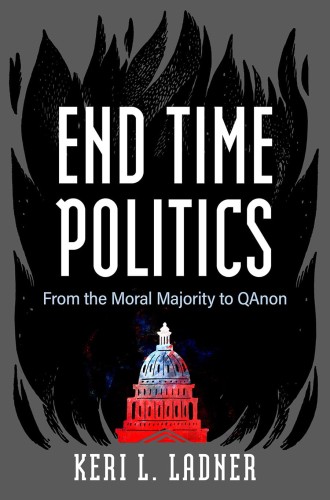Jerry Falwell’s toxic legacy
Keri Ladner digs into the Moral Majority founder’s archives to show how his fantastical interpretations of world politics seeded the ground for QAnon.

End Time Politics
From the Moral Majority to QAnon
End Time Politics is primarily an examination of the disastrous apocalyptic, dispensational, politicized theology of the late Jerry Falwell. Keri Ladner, who holds a PhD from Edinburgh University, has dug around in the available sermons, speeches, newsletters, and briefings of the depressing Falwell collection, sparing the rest of us from having to do it. She shows how this thinly educated man twisted an already highly questionable version of Protestant thought known as dispensational theology to underwrite what was essentially conservative White southern Americanism—complete with its segregationism, “biblical capitalism,” anti-communism, militarism, nationalism, patriarchy, anti-abortionism, homophobia, and denialism on matters such as climate change.
The author’s greatest discovery, in my reading, is the centrality for Falwell of a consistent advocacy of unregulated laissez-faire capitalism throughout his writings and speeches over many decades. This becomes a through line with all the issues he addressed. Falwell identified this ideology as biblical, based on a few proof texts from scripture. He deployed it to oppose everything from the New Deal to the civil rights movement to public schools to environmentalism. Ladner helps readers understand how the Cold War helped turbocharge conservative opposition to pretty much the entire progressive project, and she helps us make sense of why the strategy of labeling enemies as socialists or communists—30-plus years after the end of the Soviet Union—remains such an important part of the right-wing playbook to this day.
The most creative part of the Falwell strategy—and he was by no means alone in this—was his facile interpretation of current events over many decades to fit into an end-times scenario in which Jesus’ return was always just around the corner. Ladner shows that in terms of classic Darbyite/Scofieldist dispensationalism, Falwell’s primary theological innovation was to claim repeatedly that supposedly predetermined events in the end-times scenario (such as the timing of the apocalypse and who exactly would be burned to death at what moment) could be altered by just the right amount of repentant conservative Americanism before it was too late.





